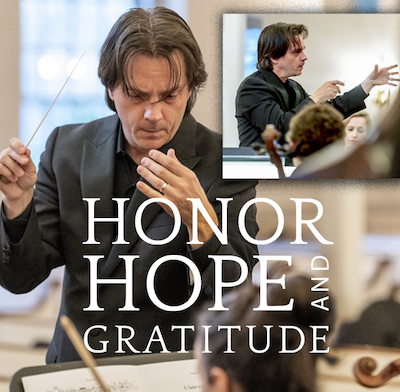by Daniel Hathaway

Subtitled “Tender reflections on a challenging year,” the program, curated by artistic director Daniel Meyer and released on the OurConcerts.live platform, offered nine soothing miniatures or excerpts from larger works, all for strings alone. As Meyer told us in an interview, “Everything on this program is cut from the same cloth, and meant to be gentle, placid, and consoling.”
That could be a recipe for programmatic disaster, but in this case it worked, largely because each piece Meyer chose is a gem in its own right. And within the emotional parameters he established, each is just stylistically different enough to add variety to the mix.
Arvo Pärt’s Silouan’s Song evokes the prayer of an Eastern Orthodox monk who took up residence on Greece’s Mount Athos. Although the subject is ascetic, the performance established the ensemble’s rich, sonorous sound, changed up in the middle with a move into thinner treble regions. Expressive rests leavened the textures.
Vaughan Williams wrote his Five Variants on Dives and Lazarus on commission for performance at the 1939 New York World’s Fair. More listeners probably recognized the melody from the composer’s adaptation as a hymn tune, Kingsfold, than from its original form as a folk song, which Vaughan Williams claimed to have collected himself in the village of Kingsfold in West Sussex. It might have become extinct except for pieces like the Five Variants, where the composer’s modal counterpoint presents it in five attractive guises. BlueWater played the variations with sensitive transparency.
George Walker’s Lyric for Strings and the Andante from Florence Price’s String Quartet in G are receiving the more frequent performances they deserve, spurred by the recent imperative to include more works by Black musicians on concert programs. Both pieces can proudly stand on their own. While the Walker is more abstract, Price draws on her musical heritage to flavor this movement of her quartet with engaging hints of spirituals.
Taking her place at the piano, Oberlin professor Angela Cheng introduced a new musical voice midstream in this program, giving a thoroughly poetical reading of the slow movement from Chopin’s First Concerto and a searching performance of Gerald Finzi’s Eclogue in which soloist and strings alternate in an elegiac colloquy that couldn’t have been written by anyone else.
The slow movement from Elgar’s Serenade for Strings, and his Sospiri, a companion piece to his popular Chanson de Matin, continued in the British pastoral vein.
At the end came something unusual: Jean Sibelius’ Andante Festivo, originally written for the anniversary of a group of Finnish sawmills, then repurposed as a double string quartet for the wedding of the composer’s daughter. Its final iteration for string orchestra came when Sibelius was asked for a piece to be played at the New York World Exhibition in 1939 as Finland’s greeting to the world. It’s an extended, noble chorale with an ‘Amen’ that suddenly introduces timpani rolls, giving Ariel Zaviezo a brief but compelling cameo appearance.
The audio-visual production values of the video matched the high quality of the performances. If it proved a little jarring to suddenly cut from views of the musicians to cameras wandering the aisles and corridors or panning across the empty seats of the auditorium, the Maltz Performing Arts Center is undeniably photogenic. It’s too bad that the video is no longer viewable on-demand.
Published on ClevelandClassical.com June 2, 2021.
Click here for a printable copy of this article



